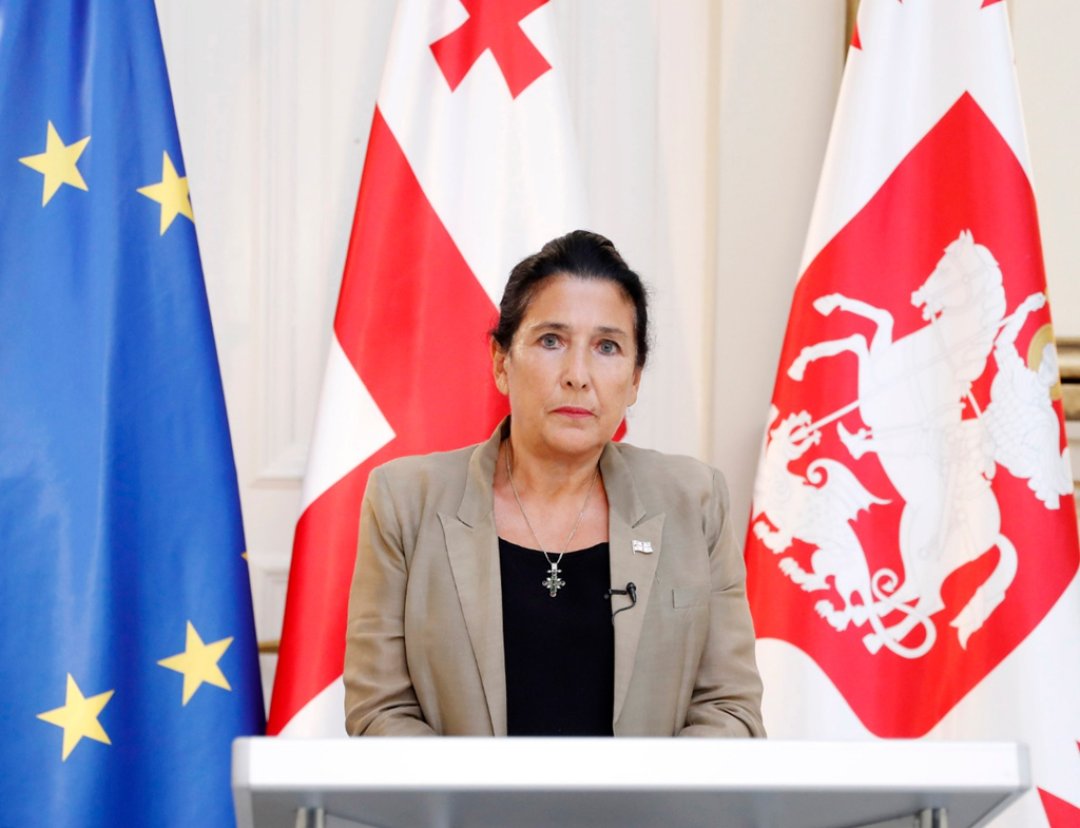
Georgia's President Addresses Key Issues in BBC Interview

During an interview with the BBC on February 29, Georgian President Salome Zourabichvili emphasized the urgent need for a proactive response to Russia's construction and operation of a port in occupied Abkhazia. She underscored that the European Union should recognize the Black Sea as a de facto European sea, asserting Europe's right to be present in the region. President Zourabichvili expressed concern that the construction of a Russian port in occupied Abkhazia, particularly amid the conflict in Ukraine, could potentially draw Georgia into war. She highlighted the project as part of Russian propaganda and psychological warfare tactics, noting similarities to previous situations in Ukraine. Zourabichvili emphasized the significance of preventing Russia from gaining control over the Black Sea, stressing the need for European understanding and intervention. She warned that allowing Russia to control this part of the Black Sea would jeopardize future European Union projects related to the region's connectivity and strategic transport routes.
Zourabichvili also commented on Bidzina Ivanishvili's return to politics, stating that his reemergence helps dispel shadows surrounding the country's power source. She highlighted the previous ambiguity surrounding power dynamics, emphasizing the lack of accountability to the people. She expressed a sense of clarity that Ivanishvili's political role is transparent now despite his considerable wealth. She compared similar figures in other countries, noting that individuals of substantial wealth are often referred to as billionaires rather than oligarchs. The president stressed the importance of establishing conditions that prevent the consolidation of oligarchic power within the country, underlining the need for transparency and accountability in governance.
Moreover, Zourabichvili addressed the comparison between Mikheil Saakashvili and Alexei Navalny, emphasizing that Saakashvili's incarceration stems from actions taken during his presidency, not merely as a political opponent. "It is not my judgment; it is the judgment of the judges, the Georgian population, but the fact is that the majority of the Georgian population believes that when he was the president of Georgia, he exceeded his authority in many ways and that is why he is in prison today," the president stated. Zourabichvili underscored her moral prerogative concerning the right to pardon, noting that she does not engage in pre-discussions regarding this matter. Regarding concerns about Saakashvili's well-being in prison, Zourabichvili expressed confidence that such extreme circumstances would not transpire. "I don't think he will die in prison, I have been in daily contact with government officials to ensure that nothing like that happens," she asserted. Nonetheless, she acknowledged that the government holds direct responsibility, particularly the Minister of Justice, and extradition remains a possibility. In response to the journalist's inquiry about Poland and Ukraine's willingness to accommodate Saakashvili, Zourabichvili acknowledged the possibility, stating, "It is possible."
Furthermore, Zourabichvili highlighted Russia's pursuit of a hybrid war strategy, emphasizing its aim to destabilize through propaganda. She stated, "Russia invaded Georgia at least three times. It continues to occupy our territories. It is about direct occupation, Russian military bases on our territory." Zourabichvili underscored Russia's ongoing efforts to destabilize Georgia, citing the frequent kidnappings and hostage-taking incidents in the occupied territories. She remarked on Georgia's resilience, noting its ability to navigate such challenges due to its experience. In response to a question regarding Russia's intentions towards Georgia, Zourabichvili expressed concerns that Russia's ambitions extend beyond Georgia, possibly encompassing parts of Europe. She characterized Russia's aspirations as rooted in a desire to maintain imperial dominance.
Regarding the situation in Ukraine, Zourabichvili conveyed apprehension about the potential consequences of Putin's success there. She acknowledged the gravity of the situation, stating, "I think we should all be afraid if President Putin succeeds in Ukraine." However, she expressed doubt in Putin's ability to achieve his strategic ambitions, asserting that his endeavors to divide Ukraine and undermine European unity have not come to fruition. She concluded by emphasizing that while Putin may not have suffered military defeat, he cannot be deemed victorious in his pursuits.
See Also


Simonyan: “Armenia Should Trade with Turkey and Azerbaijan Instead of Closing Borders”

Mirzoyan Meets US Deputy Assistant Secretary Joshua Huck

Azerbaijani President Holds Talks with UAE and German Business Delegations on Economic Cooperation

Grigoryan Confirms Armenia’s Readiness to Dissolve OSCE Minsk Group Upon Peace Treaty Signing

